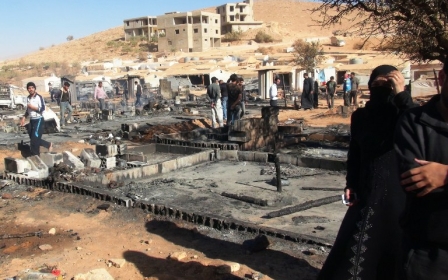17 al-Nusra and 10 Hezbollah fighters killed in Lebanon clashes

Fierce fighting raged in east Lebanon on Sunday, with ten Hezbollah fighters and between 15 to 17 Syrian-based militants confirmed dead.
The clashes happened on the Syria-Lebanon border area near the town of Nabi Sbat, about 40 kilometres south of Arsal, another troubled border town where the Lebanese Army has been clashing repeatedly with Syria-based militants.
A Hezbollah security official on Monday confirmed the deaths of 10 of its fighters, saying that the fighting broke out after gunmen crossed the border from Syria and began attacking Hezbollah posts in the area.
Earlier accounts said that only five Hezbollah fighters had been killed, although some 30 more are believed to have been wounded.
"Hezbollah posts in the mountains around Nabi Sbat, east of Baalbek, were attacked by armed groups who came from Qalamun" a Hezbollah source told AFP.
"Hezbollah returned fire, inflicting heavy losses among the attackers."
According to the source “dozens” of militants were killed, although there have been conflicting reports about which Syria-based al-Qaeda inspired group the fighters belonged to. Most sources seem to indicate that between 15 to 17 militants were killed.
While most reports indicate that al-Qaeda’s official representative in Syria, the al-Nusra Front, had led the offensive Hezbollah sources told Lebanon’s English-language daily, The Daily Star, and Arabic daily Alfajr new that Islamic State militants were also involved in the offensive.
IS and al-Nusra were originally allied in Syria, but officially split earlier this year. However, since the US-led coalition began pounding IS positions, and some other al-Qaeda offshoots in Syria in late September, there have been tentative signs that the two groups could be edging closer to reconciliation.
According to local sources, quoted in The Daily Star and the Washington Post hundreds of militants crossed the border and began firing on at least 10 Hezbollah outposts before reinforcements arrived and managed to push the assailants back.
An AFP correspondent in nearby Baalbek said that the fighting could be heard in the town, some 10 kilometres west of Nabi Sbat. Hezbollah's al-Manar television reported late on Sunday that the group had now pushed back the militants and that the fighting had ended. On Monday morning, various reports said, the town appeared calm.
The Lebanese Army reportedly deployed to the area and tried to prevent civilians from getting involved in the fighting, although it does not seem to have actively taken part in the fighting.
The latest flare-up in violence follows months of tensions that have seen Hezbollah and the Lebanese Army battle militants from Syria in eastern Lebanon.
"All the fighting is taking place inside Syrian territories as militants are seeking to gain a foothold in Qalamoun [the mountainous border areas] where their presence is weak," the source said. "They have been launching intermittent attacks every now and then."
Hezbollah may now be looking to launch an offensive to drive out the militants from the mountainous regions, the source said.
"The party appears to be preparing to target their hideouts in the hillsides overlooking Brital so as to free the area of the militants," the source added.
Lebanon's official National News Agency also reported the clashes, saying they erupted after an attack launched by gunmen from Asaal al-Ward in Syria's Qalamun province.
Hezbollah, a close ally of Syrian President Bashar al-Assad that has sent fighters into Syria to fight alongside his forces. It is vehemently opposed by the Syrian opposition in general, and the more Islamist aspects of it -that have dubbed its Shiite fighters heretics - in particular.
Middle East Eye propose une couverture et une analyse indépendantes et incomparables du Moyen-Orient, de l’Afrique du Nord et d’autres régions du monde. Pour en savoir plus sur la reprise de ce contenu et les frais qui s’appliquent, veuillez remplir ce formulaire [en anglais]. Pour en savoir plus sur MEE, cliquez ici [en anglais].




